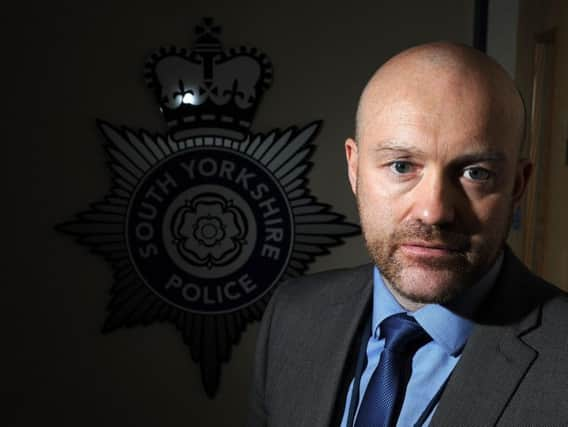Knife crime crackdown across Yorkshire sees more police on the streets this week


As part of the nationwide Operation Sceptre, police across Yorkshire will be using controversial stop and search powers to seize knives, as well as searching open land for discarded weapons and increasing patrols.
Advertisement
Hide AdAdvertisement
Hide AdDetective chief inspector Paul Murphy, who heads up the South Yorkshire Police’s response to knife crime, was keen to stress that the measures were being run in collaboration with the community.
He told the Yorkshire Post: “South Yorkshire Police need to be part of the solution, but can't be the whole solution. It is those very people and those agencies that are ingrained within those communities where knife crime is prevalent that need to lead, supported as always by South Yorkshire Police.”
Though often criticised as heavy-handed, measures like stop and search are being deployed in areas with a higher incidence of violent crime.
“They are intelligence-led. They are statistically-led about where numbers of knife crimes are recorded.
Advertisement
Hide AdAdvertisement
Hide Ad“Stop search is a is a legitimate effective tool in the short term, without a shadow of a doubt, and it's something that South Yorkshire Police are very much utilising certainly through [the] week.
“It is a tactic that gives reassurance to our communities. It's a tactic that does yield results.”
The action comes after four people suffered knife wounds in separate stabbing incidents in Sheffield last week.
“In relation to all the incidents [last] week, the reassurance I can offer is that we are aware of the alarm that this will cause.
Advertisement
Hide AdAdvertisement
Hide Ad“But we have taken a very swift robust response and a number of arrests have been made. The investigations are progressing well and additional staff have been deployed into those locations. We will pursue anybody that we know carries a knife.”
DCI Murphy said among plans to boost traditional policing this week, officers will also be working with schools, community organisations and local councils to ensure young people are educated about the dangers of carrying knives.
“Early intervention around young people is critical to the long term aim of stopping young people thinking that it's acceptable, whatever the reason, to pick up a knife.
Advertisement
Hide AdAdvertisement
Hide Ad“The reality is, if you pick up a knife, you are three times more likely to be the victim of a knife crime.”
Though many cases of knife crime involve teenagers, most of the perpetrators and victims are in their twenties and thirties.
DCI Murphy said the programme of education was about reducing knife crime long-term.
“This is an approach that will take a number of years to come to fruition. We accept at this moment in time it's right in everybody's mind, there is alarm within communities about knife-enabled crime and knife-related crime. It is a long term approach.”
Advertisement
Hide AdAdvertisement
Hide AdHe urged anyone with concerns about a family member or who wanted to report someone carrying a knife to contact police.
“There are processes and policies in place that if somebody does want to come forward, but does want to talk to us, but then what still wants to remain anonymous, we can work with that. And we can protect those individuals.”
Also in news: I'll open up devolution talks with Leeds and West Yorkshire, Boris Johnson tells northern leaders
He added: “We're always looking at how we can improve confidence in policing, and how we can improve trusted trust in our approach.”
Advertisement
Hide AdAdvertisement
Hide Ad“We are making progress, but it's going to be a long journey.”
Last month, South Yorkshire’s Police and Crime Commissioner was awarded £1.6m in funding to create a Violence Reduction Unit to help fight violent crime. The money came from a £35m national fund and is being spent on a number of short and long-term projects aimed at diverting people away from violence, including a new sports scheme with five local football clubs sport foundations that will run in crime hot spot areas and additional support services and workshops for vulnerable people.
Anyone wishing to report knife crime should call 101 (non-emergency police hotline), 0880 555 111 (Crimestoppers anonymous hotline), or visit the Crimestoppers website.